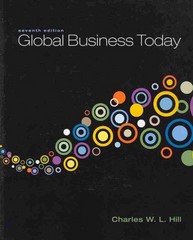For several years now the European Union, the largest regional trading bloc in the world, has been
Question:
For several years now the European Union, the largest regional trading bloc in the world, has been trying to liberalize its energy market, replacing the markets of its 27 member states with a single continent-wide market for electricity and gas. The first phase of liberalization went into effect in June 2007. When fully implemented, the ability of energy producers to sell electricity and gas across national borders will increase competition. The road toward the creation of a single EU energy market, however, has been anything but easy.
Many national markets are dominated by a single enterprise, often a former state-owned utility. Electricitie de France, for example, has an 87 percent share of that country’s electricity market. Injecting competition into such concentrated markets will prove difficult.
To complicate matters, most of these utilities are vertically integrated, producing, transmitting, and selling power. These vertically integrated producers have little interest in letting other utilities use their transmission grids to sell power to end users, or in buying power from other producers. For the full benefits of competition to take hold, the EU recognizes that utilities need to be split into generation, transmission, and marketing companies so that the business of selling energy can be separated from the businesses of producing it and transmitting it. Only then, so the thinking goes, will independent power marketing companies be able to buy energy from the cheapest source, whether it is within national borders or elsewhere in the EU, and resell it to consumers, thereby promoting competition.
For now, efforts to mandate the de-integration of utilities are some way off. Indeed, in February 2007 national energy ministers from the different EU states rejected a call from the European Commission, the top competition body in the EU, to break apart utilities. Instead the energy ministers asked the commission for more details about what such a move would accomplish, thereby effectively delaying any attempt to de integrate national power companies. In mid-2008, they reached a compromise that fell short of mandating the unbundling, or de-integration, of national energy companies due to powerful opposition from France and Germany among others (both nations have large vertically integrated energy companies).
Questions
1. What do you think are the economic benefits of liberalizing the EU energy market? Who stands to gain the most from liberalization?
2. What are the implications of liberalization for energy producers in the EU? How will the environment they face change post-liberalization. What actions will they have to take?
3. Why is the de-integration of large energy companies seen as such an important part of any attempt to liberalize the EU energy market?
4. Why do you think progress toward the liberalization of the EU energy market has been fairly slow so far?
Step by Step Answer:






